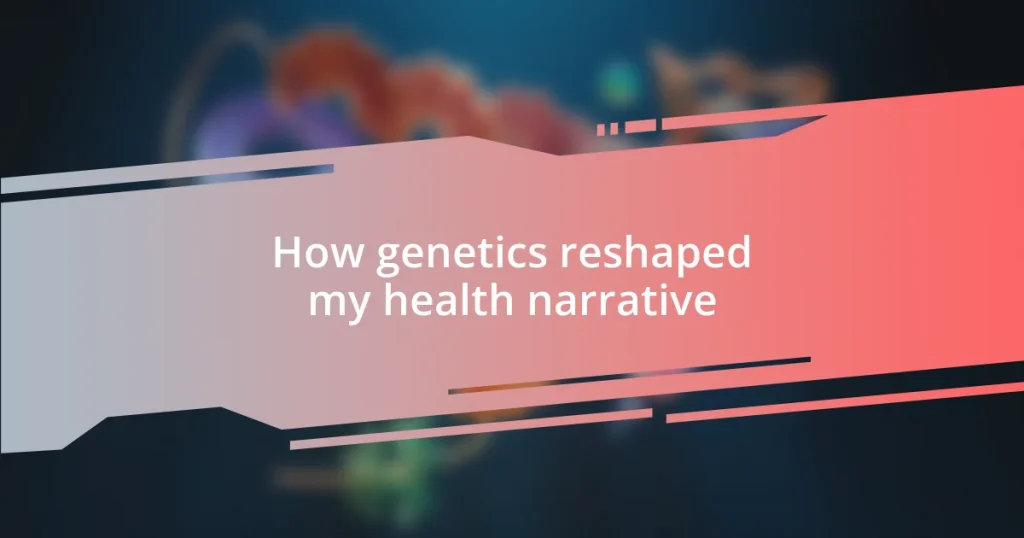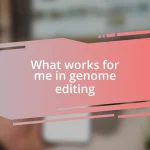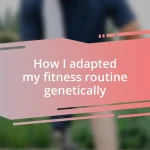Key takeaways:
- Discovering genetic predispositions empowers individuals to make informed health choices and tailor prevention strategies based on personal genetic information.
- Understanding pharmacogenomics allows for personalized treatment plans, enhancing the effectiveness of medications by aligning them with one’s genetic makeup.
- Sharing genetic insights within families fosters open dialogue about health, transforming collective health narratives and encouraging proactive lifestyle changes.
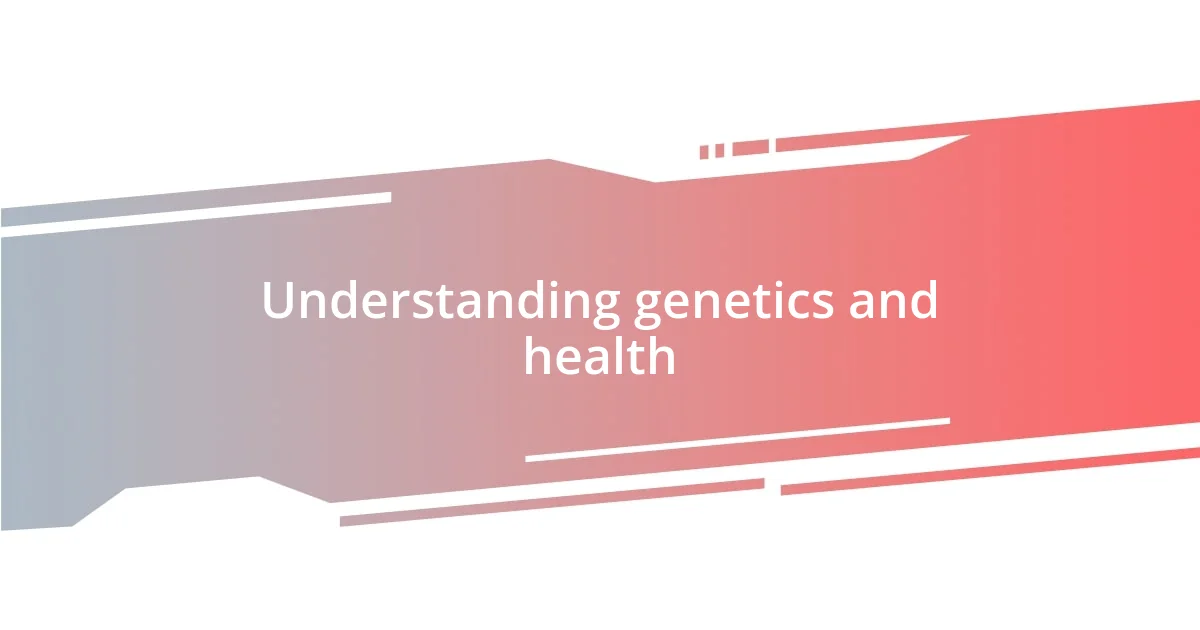
Understanding genetics and health
Genetics plays a crucial role in our health, influencing everything from our susceptibility to diseases to the efficacy of certain treatments. I remember when I first discovered that my family had a history of heart disease; it was like a lightbulb went off, illuminating the connection between my genes and my own health risks. Have you ever considered how much of your health story is written in your DNA?
The impact of genetics isn’t just about inherited conditions; it can also shape our responses to diet and exercise. Reflecting on my own journey, I realized that what works for others might not work for me. For instance, I once tried a popular weight-loss program that failed miserably, only to find out later that my genetic makeup was wired to respond better to different types of nutrition. It raises the question: how many of us are chasing plans without understanding our genetic framework?
Understanding genetic influences can empower us to take charge of our health in more personalized ways. It’s fascinating to think about how advances in genetic testing have opened up new avenues for me. After learning about specific markers linked to my health, I felt more equipped to make informed lifestyle choices. Isn’t it remarkable how a deeper understanding of our genetic information can revolutionize the way we approach our well-being?
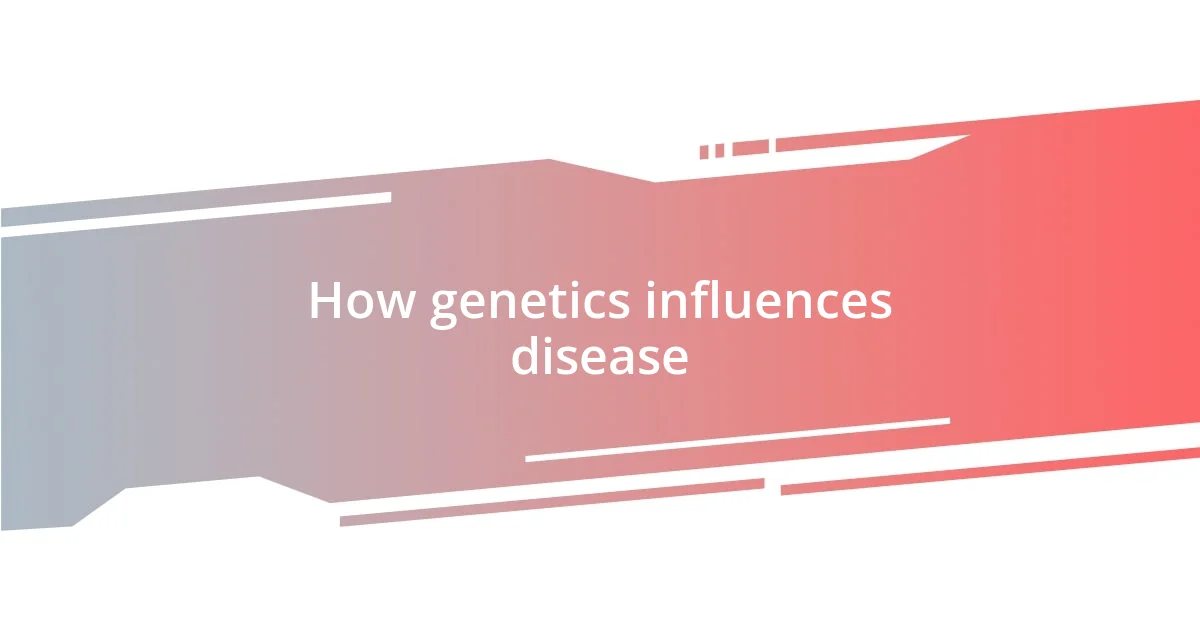
How genetics influences disease
Genetics significantly influences how diseases manifest in our bodies. When I learned about my predisposition to certain conditions, it was both enlightening and daunting. It felt like a double-edged sword; on one side was the distress of potential health issues, and on the other was the empowering knowledge that allowed me to take preventive action. Just understanding that my risk for diabetes was higher because of my genetic background made me rethink my lifestyle choices.
- Genetics can determine susceptibility to various diseases, such as:
- Heart disease
- Diabetes
- Certain cancers
- Autoimmune disorders
- Mental health conditions
By recognizing genetic markers, we can tailor prevention strategies and treatment approaches uniquely suited to ourselves. I remember vividly attending a genetic counseling session, where they explained how specific gene variations impact pharmacogenomics (how our genes affect our response to medications). Suddenly, the idea that my body might react differently to a standard medication became incredibly personal, pushing me to advocate for tailored treatment based on my genetic make-up. This awareness shifted my health narrative towards a proactive stance, rather than a reactive one.
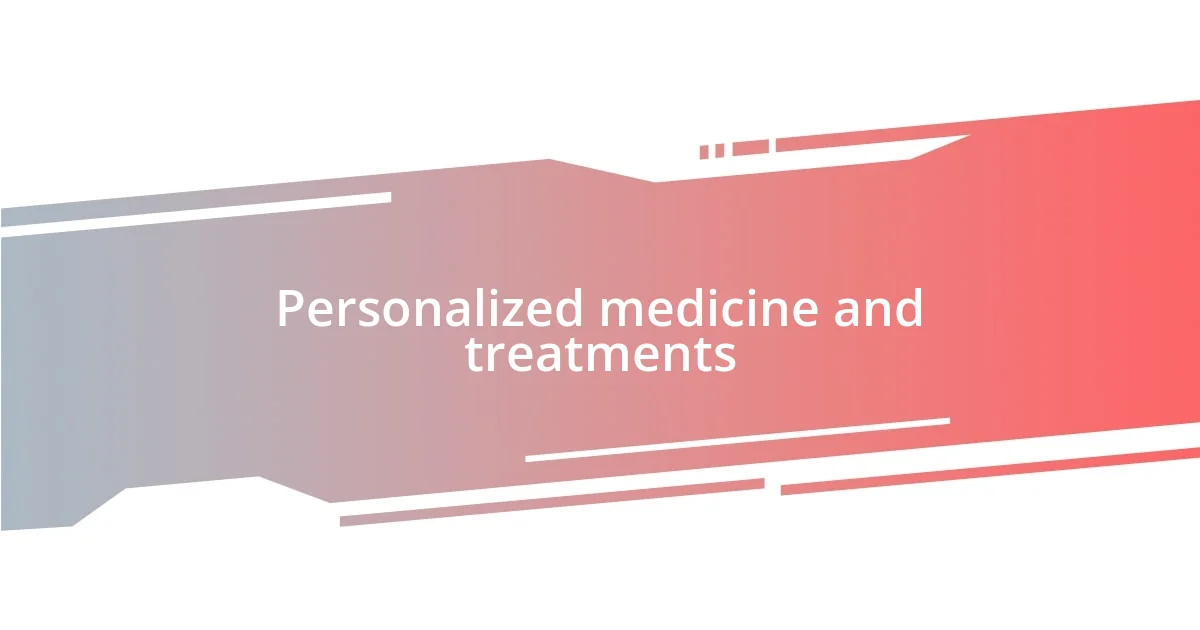
Personalized medicine and treatments
Understanding personalized medicine has transformed my health journey. When I first learned about pharmacogenomics, it felt like a revelation. I was always an advocate for alternative treatments but didn’t realize how my genetic makeup could influence my response to traditional medications. For example, after discussing my family history with a doctor, we discovered that certain medications could potentially exacerbate a condition I didn’t even know I had. This insight made me realize that the right treatment isn’t just about trial and error; it can also be rooted in our genetics.
The beauty of personalized treatments lies in their ability to address our unique biological makeup. I remember a time when I tried a one-size-fits-all program for medication management, and it was a frustrating experience. It didn’t apply to my specific needs, making me feel defeated. But now, having genetic tests done means the medications prescribed will work better for my individual needs. It’s like upgrading from a generic vehicle to a customized race car—it just fits better and performs optimally.
The evolution of personalized medicine has opened a world of possibilities. I often reflect on how this tailored approach has made me feel more in control. Sharing this journey with my healthcare team felt collaborative; they truly understood my health narrative. Seeking treatments based on my DNA felt empowering, as if I was taking charge rather than just receiving a prescription. I wonder how many others are out there, waiting to discover a tailored health journey of their own.
| Personal Experience | Health Outcome |
|---|---|
| Discovered pharmacogenomics and its influence on medication response | Developed more effective treatment plans tailored to my genetic profile |
| Frustration with generic treatment plans | Shifted to personalized approaches leading to better outcomes |
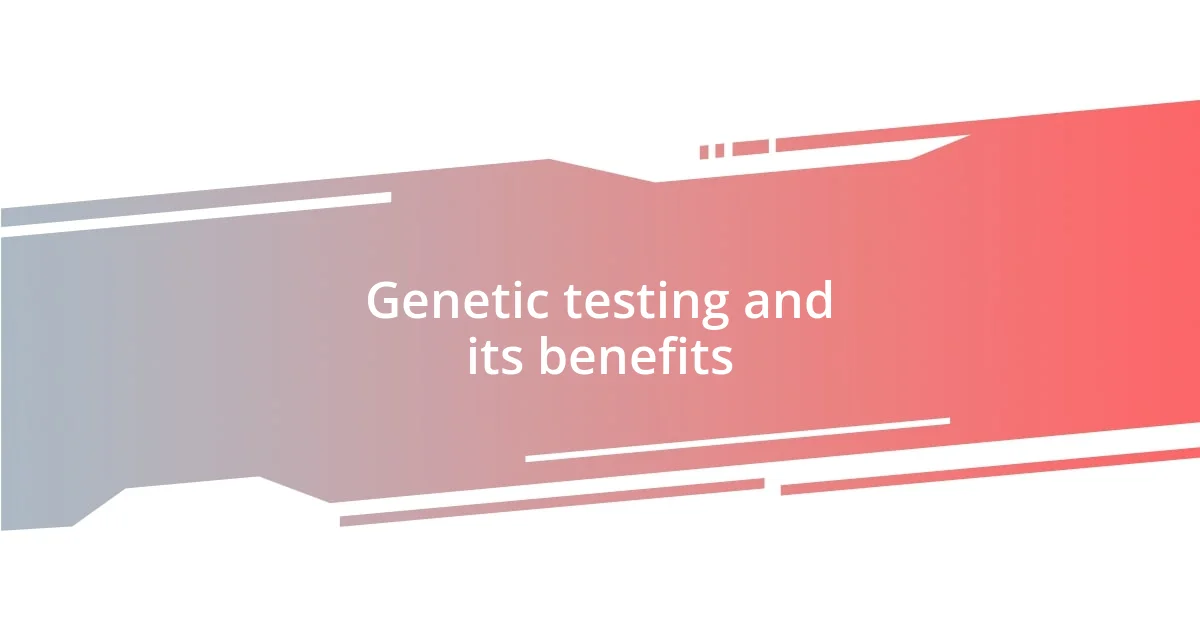
Genetic testing and its benefits
Genetic testing has provided a clearer picture of my health journey, and I can’t emphasize how beneficial it has been. When I received my results, there was an overwhelming mix of nerves and hope. Knowing my genetic predispositions not only prepared me for future health challenges but also empowered me to make informed decisions about my lifestyle and regular screenings. Isn’t it incredible to think that just a test can unlock insights into our health that we might never have discovered otherwise?
One aspect I truly appreciate about genetic testing is its role in preventive care. After I learned about specific gene markers linked to heart disease in my family, I took proactive steps like adjusting my diet and increasing my physical activity. It wasn’t just about fearing the worst; instead, it felt like I was gaining an ally in my health. This willingness to embrace change is something I believe more people could benefit from—how often do we ignore signs until it’s too late?
Reflecting on my experiences, I can’t help but wonder about the potential of genetic testing for everyone. It’s such a game-changer, offering a personalized health narrative that feels intimate and tailored. I remember discussing my results with friends who had yet to undergo testing; their curiosity mixed with skepticism made me realize how much knowledge there is to share. There’s a sense of community in seeking this information together—if we all had access to our genetic information, how different would our approaches to health be?
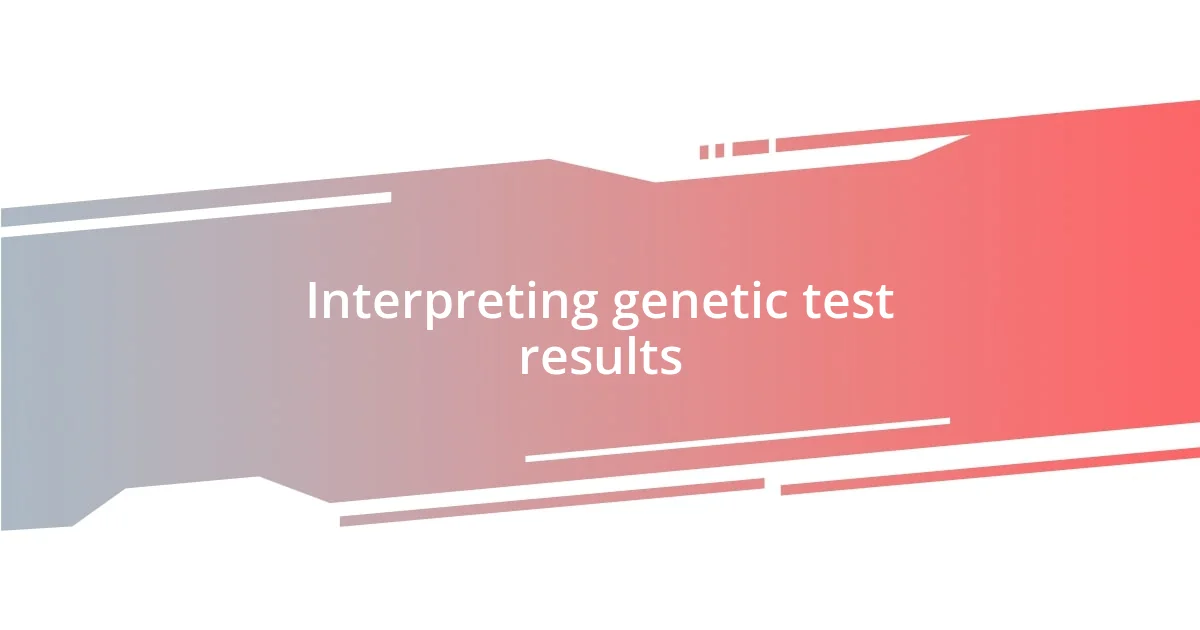
Interpreting genetic test results
Interpreting genetic test results can feel like piecing together a complex puzzle. When I first saw my report, my head swirled with scientific jargon. Terms like “single nucleotide polymorphism” (SNP) hinted at a genetic predisposition, but I needed that clarity. I vividly recall sitting with my genetic counselor, who helped me untangle it all. Their explanation bridged the gap between the science and my life, illuminating what each result meant for my health.
In one poignant moment, I learned that my genetic profile heightened my risk for diabetes. Rather than panic, I felt an unexpected wave of empowerment wash over me. This knowledge gave me a blueprint to prevent the onset of this condition, sparking a passion for healthier eating habits and regular exercise. Have you ever had that moment when the fear of unknown transforms into actionable insight? I certainly did, and it galvanized my resolve to prioritize my health.
I also realized how vital it was to reevaluate my family’s health narrative. As I dove deeper into my results, they opened discussions at family gatherings that were often avoided before. This not only brought awareness but also built a supportive network among my relatives, motivated by a shared goal of better health. It made me wonder: if everyone had access to their genetic blueprints, would we treat our health stories differently? The potential for collective empowerment through understanding our genetic makeup is profound.
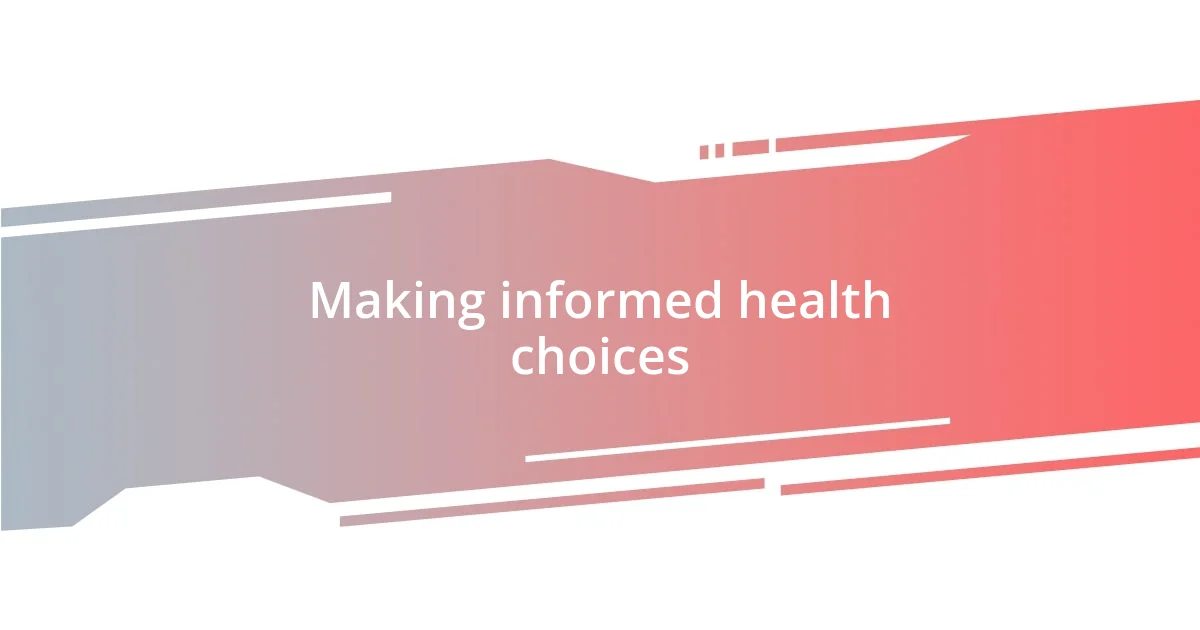
Making informed health choices
Making informed health choices becomes a transformative journey once you have insights from genetic testing. For me, realizing the impact of specific traits in my genetic makeup went beyond mere awareness; it felt like receiving a personalized roadmap. I clearly remember the day I decided to swap my usual snacks for healthier options after noticing my predisposition to cholesterol issues. It wasn’t just about changing my diet; it became a concrete step toward taking charge of my health narrative.
This journey doesn’t just end with dietary changes; it extends into my routine medical check-ups. Knowing my genetic risk factors encouraged me to advocate for regular screenings, which at times, felt like uncharted territory. I still recall a doctor’s appointment where I confidently discussed my genetic results—an experience that left me feeling empowered instead of anxious. Have you ever entered a health care setting with a sense of purpose? It makes all the difference, turning what can be a passive experience into an active dialogue about your health.
Connecting the dots between my genetics and lifestyle choices has fostered a more profound appreciation for informed decision-making. I’ve started sharing my health journey with friends, inspiring some to explore their own genetic testing. It’s astonishing how this simple act of sharing information can amplify accountability and motivation within my circle. Imagine if we all traded insights and tips instead of just wellness trends; wouldn’t that reshape our collective approach to health?
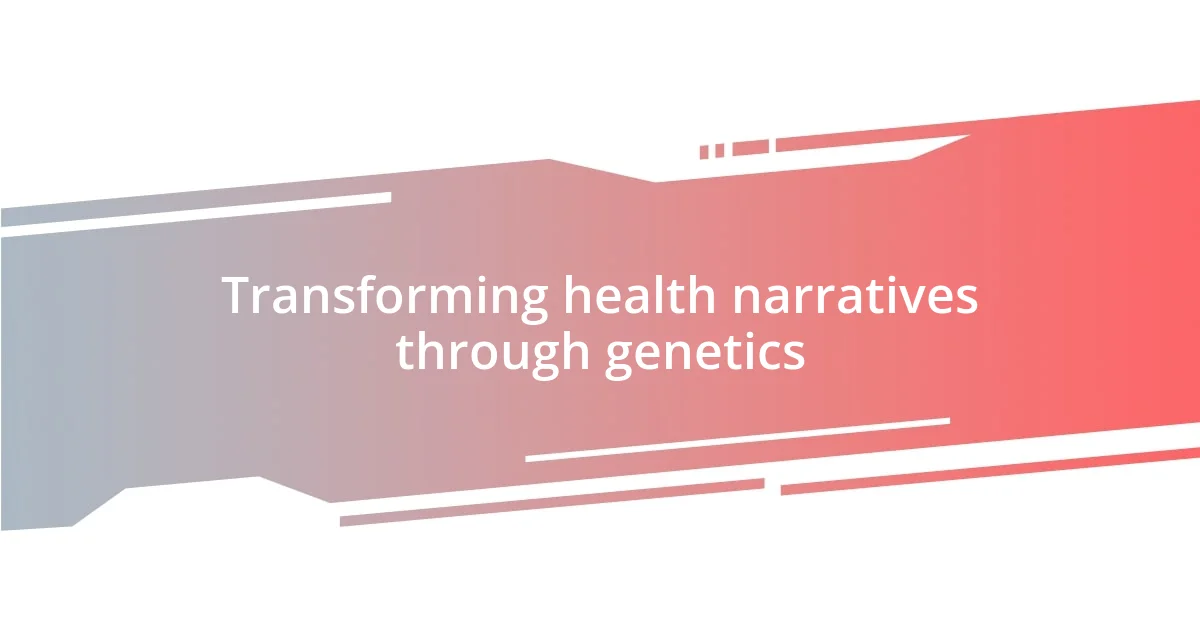
Transforming health narratives through genetics
Transforming health narratives through genetics has opened a new chapter in my personal journey. When I first explored my genetic predispositions, I felt like a detective uncovering hidden clues about my health. I remember the moment I discovered my genetic markers for anxiety; it was like someone flicked on a light switch. Suddenly, the patterns of anxiety I experienced throughout my life made sense, and it motivated me to seek tailored strategies for self-care that aligned with my unique genetic blueprint.
Engaging with my family about these findings has had a profound impact on our collective health narrative. During a family dinner, I brought up my genetic insights, and what followed was a heartfelt exchange of stories. We shared our health struggles and triumphs, all while recognizing that genetics could play a critical role in understanding our behaviors. That dialogue not only lifted the veil of secrecy surrounding our health but also reinforced the idea that knowing our genetics can empower us to change how we approach wellness as a community. Have you ever considered how sharing personal health stories could lead to newfound support and motivation?
As I reflect on this evolution, I can’t help but appreciate how much my perspective has shifted. My health narrative is no longer a passive script written by historical family diseases; it’s an interactive story where I hold the pen. Embracing my genetics has encouraged me to actively participate in my health journey. I often ask myself, what if we all embraced our genetic stories? Each of us could illuminate pathways toward healthier lifestyles, and that could lead to a monumental shift in how we view and tackle health challenges together.










